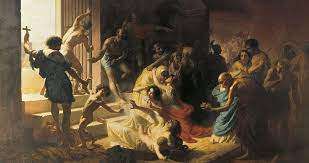
Christian Martyrs: Did They Miss Supernatural Safety
Pr. V P Philip
Cloud of Witnesses
Christian life is basically a life that faces countless atrocities and sufferings. But the beauty of this life is the continuing presence of God amidst the sufferings. There are many Christians who have already experienced such situations. We are surrounded by “such a great cloud of witnesses” (Heb.12:1), among them martyrs are shining like stars. Through this agonizing experience they also contribute to the Kingdom of God. “The blood of the martyrs is the seed of the Church.” This is what Tertullian said, according to the traditions. What Tertullian actually meant was “The more you cut us down, the more we grow; the seed is the blood of Christians.”
During occasions of difficulties, how did the ordinary Christians experience and become conscious about divine presence and protection? What does the phrase ‘divine protection during the time of atrocities, struggles and sufferings’ actually mean? Did the servants of God really enjoy God’s shelter in their struggles especially the Christian martyrs? Apostle Paul gives us an insight to this concern by saying, “We are hard pressed on every side, but not crushed; perplexed, but not despair; persecuted, but not abandoned; struck down, but not destroyed. We always carry around in our body the death of Jesus, so that the life of Jesus may also be revealed in our body” (2 Corinthians 4:8-10).
Martyr and Martyrdom
The word ‘martyr’ brings to our mind the picture of a person lying dead smeared with blood. But the real meaning is much deeper. By definition, “a martyr is one who dies for a cause’. The cause can be religious or political. Some have become martyrs for the propagation of their own ‘ideologies’. The one who gives up his or her life, or is ready to give his or her life to be a witness is a martyr; the one who renounces everything materially dear to him, patiently bearing all the persecutions, troubles or illness while achieving the goal is also a martyr. Franklin J. Balasundaram defined martyrdom as a way of life. He says, “martyrdom is an optional commission and commitment, divinely inspired.” In the Christian view point, Christian martyrdom is a part of Christian life.
The exact meaning of the Greek word ‘martus’ is witness. It is from this root meaning that the term ‘martyr’ is derived and refers to those who gave up their lives to become witnesses of Christ. The word ‘martus’ is used in the New Testament for those who witnessed the life, death and resurrection of Jesus Christ (Acts 1:8; 2:32; 3:15; 10:39; 13:31ff). When we hear the term ‘Christian martyrs’ it does not impress upon us a picture of bloody revolution but a bright depicture of those who ‘burned bright and burnt out’ out for Christ due to their deep commitment and conviction. They are the shining stars in the firmament of the Church history.
Let us examine the life and listen to the parting comments of some Christian martyrs. Did they enjoy divine protection during their martyrdom? Was the grace of God sufficient for them?
Polycarp
These were the words of Polycarp before he became a martyr for the cross of Jesus Christ, “For eighty-six years I have been His servant, and He has never done me wrong: How can I blaspheme my King who saved me.”
Polycarp was one of the notable martyrs of the first century. F.F. Bruce says that: “Polycarp was an honorable man. He was the last link in the exclusive community of those who were fortunate to see Jesus in flesh. He was tutored by Apostle John. His period was between A.D. 70 and 156”.
We have no historical evidences about the conversion experience of Polycarp. But it is noted that he ministered in Smyrna in the early years of the second century A.D. In A.D. 56, when the tribulation against the church was very severe in Asia Minor, this disciple of Christ became a martyr.
Polycarp had directly witnessed the martyrdom of many Christians. It is recorded in history that many who witnessed the brutal killing of a youth called Galmanicus, accepted Jesus Christ as their Saviour. Polycarp was also threatened. He wanted to move away from the place secretly. But a small girl recognised him and informed the soldiers. He was arrested. The king advised him to renounce Jesus and thus obtain reprieve from punishment. And this is when Polycarp replied, “I have been serving Christ for the last eighty six years. He has not done any wrong to me. How can I renounce and ridicule my Christ now?”
The people demanded that Polycarp be burnt. They collected firewood to burn the holy man to ashes. When they were about to tie him to a pillar in the middle of the stake, Polycarp said, “Don’t tie me to the pillar; I shall stand unmoved. The One who gave me courage to be burned, will also empower me to stand close to the pillar.” He prayed to the Lord to accept his martyrdom and for the believers whom he left behind.
As he closed his prayer the flames rose up. But the flames feared to touch Polycarp, who was standing with golden beauty in the midst, singing praises to the Lord. Seeing this, one soldier took his spear and stabbed Polycarp. Blood rushed out and the fire was extinguished. The enemies set the fire again and the body of Polycarp was burned out. The martyrdom of Polycarp leaves a challenging message to the Christians of all times. No matter however fiery our tests of faith be, the Lord will enable us to face them and overcome them victoriously. Divine protection for Polycarp means experience with the divine presence.
Thomas Hauker
The story of the Christian martyr Thomas Hauker (England, 1555) shows the sufficiency of the divine protection and the grace of God in our hour of need. Thomas Hauker, was a bright, well-favoured, good-looking, young gentleman, who would not deny his personal relationship with Christ.
For this he was sentenced to being burned at the stake. “Thomas”, his friend lowered his voice so as not to be heard by the guard. “I have to ask you a favor. I need to know if what the others say about the grace of God is true. Tomorrow, when they burn you at the stake, if the pain is tolerable and your mind is still at peace, lift your hands above your head. Do it right before you die.
Thomas, I have to know.”
Thomas Hauker whispered to his friend, “I will.” On the day of execution, the crowd was abuzz with Thomas’s promise. As he was chained to the stake, he spoke quietly and with great grace to the men who laid the wood.
Then he closed his eyes and the fire was kindled. Thomas continued to preach to those around him, but soon, for the roar of the flames, he could not. The fire burned a long time, but Hauker remained motionless. His skin was burnt to a crisp and his fingers were gone. Everyone watching supposed he was dead. Suddenly, miraculously, Hauker lifted his hands, still on fire, over his head. He reached them up to the living God and then, with great rejoicing, clapped them together three times. The people there broke into shouts of praise and clapping. Hauker’s friend had his answer. The grace of God was sufficient to Hauker.
Graham Staines and His Two Sons
The death of Graham Staines and his two sons was an incident which rent the hearts of all in India and beyond. It was the night of 22nd January 1999 when Graham and his two sons Timothy and Philip were charred to death while asleep.
Shocked at this barbarous act, the next morning’s popular Kerala daily, Malayala Manorama, carried this note of mourning by the famous Malayalam writer, O.V. Vijayan, “My dear Staines, you came to my land to wash and clean the wounds of the untouchable lepers. I know that you will grant me the pardon of the Son of God. I deserve that... Let the flag of my country fly at half mast”.
Graham Staines was born on 18th January 1941 in Brisbane in the Queensland State of Australia. He was born as the second son of Joseph William and Elizabeth. He was only sixteen when dedicated his life to serve the Lord. A relationship that began as a pen friend is what brought him to India in 1964. He soon started a refuge centre for many poor and destitute in Baripada. He was a close friend of lepers for nearly 34 years. The Leprosy Centre, founded by the King of Mayurbhaj in 1895 was the main centre for Staines’ ministry.
After his marriage to Gladys, who was also born in Queensland, Australia, his mission had widened. God gave them three children, Esther, Philip and Timothy. Staines passed on to his children also the same vision that he was consumed with. Once a missionary asked Timothy, “Will you go back to Australia when you grow up?” He answered: “I would like to live in India like my Daddy and Mummy.” Staines not only washed the leprous wounds of those chose to serve, he also arranged employment opportunities for those who were starving without any income. The mission of Graham Staines was to reach out and help the poor people of that area in all aspects of their life.
On January 22, 1999 Graham Staines and children were engaged in faithfully carrying out their mission among the poor aborigines in Manoharpur, 180 kilometers away from Baripada. As they had no other shelter to spend the night, they slept inside their own jeep. A few yards away the youth of the village were dancing and singing.
After midnight, at about 12.30 a group of nearly 50 men under the leadership of Dara Singh and Rabindra Singh circled the jeep of Staines and children with spears, sticks, guns, petrol and fire. They first attacked the jeep and broke its windshield. Awakened, Staines tried to jump out of the jeep with his children. Then the cruel men stabbed them with spears, trapped them in the jeep, poured petrol over them and set fire to the jeep. The father and sons clung to each other as their souls departed into the presence of the Lord, who had commissioned them for His ministry. They became an ever-living fragrance for Christ in India by their martyrdom.
Following this barbarous act, India had to bow her head in shame before the other nations of the world. After the death of her dear husband and sweet children, Gladys Saines said, “I am completely broken; I have no grievance against anybody; Jesus taught me to forgive my enemies. I pray that the assassins of my husband experience the love of God.” There is no doubt that it was through these powerful words of Gladys that the Indian nation saw and understood Jesus.
Where there are trials, atrocities, and difficult times, our God’s grace is sufficient for us. We celebrate in times of atrocity because of the abundant grace and divine protection. Dietrich Bonhoeffer once said... “We must form our estimate of men less from their achievements and failures and more from their sufferings.” William Penn supports this by saying, “No pain, no palm; No thorns, no throne; No gall, no glory; No cross, no crown.”


